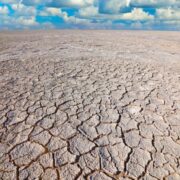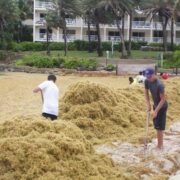Barbadians told to be prepared for long drought and hot season
Black Immigrant Daily News
The Director of the Barbados Meteorological Service (BMS), Sabu Best, is warning Barbadians that they should be prepared for a long drought period given that “there is not going to be any rainfall that is going to be coming in anytime soon”.
Best said that over the past couple of weeks, there has been a “significant reduction in rainfall across the island” and that the dry conditions, dry air, and abundance of sunshine “is actually leading to a lot of drying out of the top soils across the island, and a lot of areas are actually turning brown in fields and cane fields…”
“So, I know a lot of residents have noticed a lot of cane fires or grass fires that have been going on in the past few days,” he said, and that some of those fires actually last for a “good few hours” and even days.
“We expect that these kind of conditions are going to continue into March and into April with the dry conditions,” he said, warning the population that “there is not going to be any rainfall that is going to be coming in anytime soon.
“And so I just want all Barbadians to be aware that you can expect to see the possibility of more fires in the days to come and just be ready and be prepared. This is not an uncommon thing to actually happen during the dry season,” he said, adding that “the number of fires is probably unprecedented and also the duration of the fires.
“So, our best advice to all the public out there is just to be aware that these things are going to happen in the next few weeks, and the possibility, and just be ready. For those who have respiratory challenges, just walk with the necessary medications and take the necessary precautions to protect yourself over the next few weeks,” Best added.
He said the forecast for the future “is basically, like I said, March is going to be really dry.
“We are going to see a slight increase in April, in terms of precipitation, and more so in May, especially going into the ending part of May, and we should have a lot more relief in the early part of June as well,” the BMS director said.
Donate At Caribbean News Service, we do not charge for our content and we want to keep it that way. We are seeking support from individuals and organisations so we can continue our work & develop CNS further.
NewsAmericasNow.com




